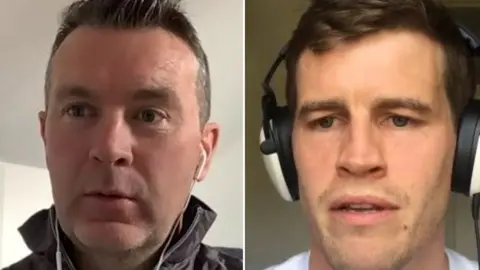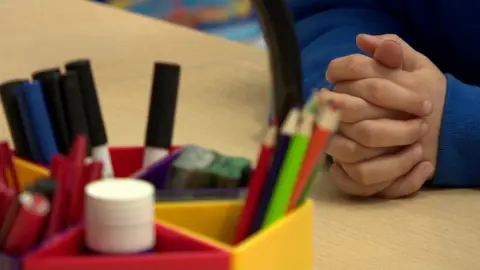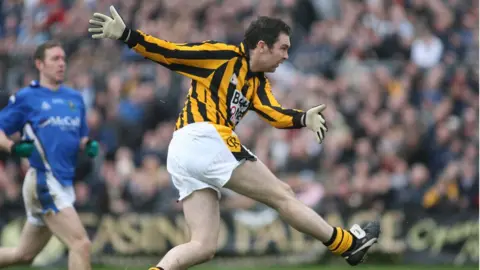Education: Former sports stars back more integrated schooling
 BBC
BBC"For me, religion and education, I don't know why they're aligned.
"I don't know why there is this underlying assumption that those two will always be aligned.
"Let's just educate our kids and then they can do religious stuff at the weekend or weeknights or outside of school hours."
Former Ulster and Ireland rugby star Andrew Trimble is as direct when talking to BBC News NI's The View programme about education in Northern Ireland as he was on the pitch.
He cannot understand why the vast majority of children in Northern Ireland go to separate schools where they rarely spend time with pupils from other religious or cultural backgrounds.
"We talk a lot about diversity in the workplace and collaborative thinking and challenging each other and how healthy that is, and if that is so healthy why do we not have it with our kids?," he asks.
"Why do they not have that day to day?
"If someone came from somewhere else and they said, 'You've got social issues and people not engaging with different communities in Northern Ireland', they would look and say, 'Well, your kids don't spend any time together'.
"It's the most obvious solution and it's been staring us in the face."
Former Armagh GAA All-Ireland winner Oisín McConville takes a similar stance, on the same programme, about what changes he would like to see in education in Northern Ireland.
He recognises that some parents will want to send their children to a school where most pupils are from a similar religious or community background, but would like to see more integrated schools.

"We can give people options - when we start giving people options as far as integrated education is concerned it becomes the norm," he said.
"But there has to be that drive and that push from governmental level.
"As far as it being filtered down to kids at 11 and 12 years of age, I think it'll become a very natural thing but we need to give people options in order to do that."
'There was no interaction'
In the aftermath of rioting in Belfast at Easter, both were interviewed on the Second Captains podcast about life in Northern Ireland.
They found themselves talking a lot about schools, education and division.
And for The View, both reflect on their own schooldays and their children's.
McConville remembers the first time he spent any time in the company of Protestants on his way to school from his hometown of Crossmaglen.
 Pacemaker
Pacemaker"I was on a bus to Armagh as I was going to the grammar school in Armagh, and at the back of the bus were the Catholics and at the front of the bus were the Protestants going to the Royal School in Armagh," he recalls.
"I was going to say that was my first interaction with somebody from the Protestant community, but there was no interaction.
"There was never any trouble or anything, but both the Protestants and the Catholics on that bus just got on the bus, travelled to Armagh and went our separate ways."
'Them and us'
Many aspects of the religious separation of schools date back to the formation of the Northern Irish state in 1921.
One hundred years on, only about 7% of children go to a formally integrated school.
Some other schools will also have pupils from a mix of backgrounds, though, while tens of thousands of children take part in shared education where those from different schools meet up for classes and projects.
But Trimble said that, while welcome, that cannot replace children being taught together day-in, day-out.
"My kids go to a primary school round the corner here and they do an exchange with kids from the other local primary school nearby," he said.
 Pacemaker
Pacemaker"My two kids, one in nursery and one in P2, were talking about this and I just was listening to their conversation.
"Even the language they used was not about religion, not about political persuasion, but people that they don't know and it was 'them' and 'us'.
"It was 'we're going to visit them', 'they're coming to visit us' and I just thought that's the seed of someone being different."
McConville thinks that many things have improved since he went to school and there have been, as he puts it, "baby steps" forward.
But not to the extent he would like to see.
"I have always said that my kids growing up in the same area that I grew up in, their lives are poles apart from what we experienced and that is brilliant," he said.
"We're in a time of peace.
"But there's so many parallels to when I was young and going through the school system.
"My kids are going to more or less follow the same system as I did which honestly is surreal and it's pretty shocking."
'Staring us in the face'
Trimble knows that schools cannot be given full responsibility for tackling Northern Ireland's divisions, but he is similarly frustrated about the pace of change in teaching more children together.
"We accept it because it has always been the way it has been, it will continue to be the way it is," he said.
"It might not solve all of our problems in the future but it'll certainly progress things a lot - spending time with each other, spending time with different communities.
"It's right there staring us in the face and we've grown up through it and we never think to challenge it because it's the norm.
"I know maybe I'm not spotting a potential issue with it but whenever I look at that it seems like a really obvious solution to get kids spending time together to get them understanding each other.
"Why are people not speaking about this more? Why is this not a bigger issue or identified as a bigger issue?"
The View is on BBC One NI on Thursday 27 May at 22:45 local time and afterwards on the BBC iPlayer.
